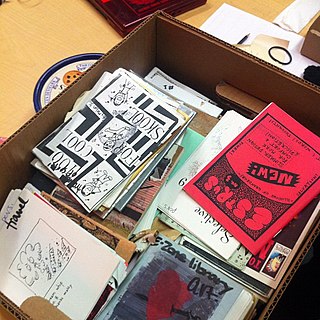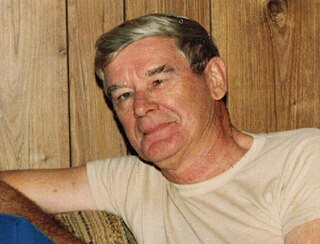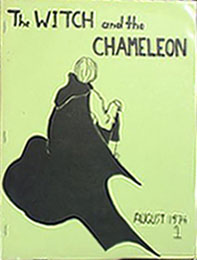A fanzine is a non-professional and non-official publication produced by enthusiasts of a particular cultural phenomenon for the pleasure of others who share their interest. The term was coined in an October 1940 science fiction fanzine by Russ Chauvenet and first popularized within science fiction fandom, and from there the term was adopted by other communities.

Science fiction fandom or SF fandom is a community or fandom of people interested in science fiction in contact with one another based upon that interest. SF fandom has a life of its own, but not much in the way of formal organization.

A zine is a small-circulation self-published work of original or appropriated texts and images, usually reproduced via a copy machine. Zines are the product of either a single person or of a very small group, and are popularly photocopied into physical prints for circulation. A fanzine is a non-professional and non-official publication produced by enthusiasts of a particular cultural phenomenon for the pleasure of others who share their interest. The term was coined in an October 1940 science fiction fanzine by Russ Chauvenet and popularized within science fiction fandom, entering the Oxford English Dictionary in 1949.

A science-fiction fanzine is an amateur or semi-professional magazine published by members of science-fiction fandom, from the 1930s to the present day. They were one of the earliest forms of fanzine, within one of which the term "fanzine" was coined, and at one time constituted the primary type of science-fictional fannish activity ("fanac").
Mike Glyer is both the editor and publisher of the long-running science fiction fan newszine File 770. He has won the Hugo Award 12 times in two categories: File 770 won the Best Fanzine Hugo in 1984, 1985, 1989, 2000, 2001, 2008, 2016 and 2018. Glyer won the Best Fan Writer Hugo in 1984, 1986, 1988, and 2016. The 1982 World Science Fiction Convention (Worldcon) committee presented Glyer a special award in 1982 for "Keeping the Fan in Fanzine Publishing."
File 770 is a long-running science fiction fanzine, newszine, and blog site published/administered by Mike Glyer. It has been published every year since 1978, and has won a record eight Hugo Awards for Best Fanzine, with the first win in 1984 and the most recent in 2018.

Theodore Edwin White is a Hugo Award-winning American science fiction writer, editor and fan, as well as a music critic. He writes and edits as Ted White. In addition to books and stories written under his own name, he has also co-authored novels with Dave van Arnam as Ron Archer, and with Terry Carr as Norman Edwards.

Arthur Wilson "Bob" Tucker was an American author who became well known as a writer of mystery, action adventure, and science fiction under the name Wilson Tucker.

Charles Nikki Brown was an American publishing editor, the co-founder and editor of Locus, the long-running news and reviews magazine covering the genres of science fiction and fantasy literature. Brown was born on June 24, 1937, in Brooklyn, New York. He attended City College until 1956, when he joined the military at age 18; Brown served in the United States Navy for three years. Following his discharge from navy service, he went to work as a nuclear engineer but later on changed careers and entered the publishing field; Brown became a full-time science fiction editor with Locus in 1975.

The 63rd World Science Fiction Convention (Worldcon), also known as Interaction, was held on 4–8 August 2005 at the SEC Centre with the attached SEC Armadillo and Moat House Hotel in Glasgow, United Kingdom. Parties took place at the Hilton Hotel.

Richard E. Geis was an American science fiction fan and writer, and erotica writer, from Portland, Oregon, who won the Hugo Award for Best Fan Writer in 1971, 1975, 1976, 1977, 1978, 1982 and 1983; and whose science fiction fanzine Science Fiction Review won the 1969, 1970, 1977 and 1979 Hugo Awards for Best Fanzine. His The Alien Critic won the Best Fanzine Hugo in 1974, and in 1975 as sole first place.
John Raymond Brosnan was an Australian writer of both fiction and non-fiction works in the fantasy and science fiction genres. He was born in Perth, Western Australia, and died in South Harrow, London, from acute pancreatitis. He sometimes published under the pseudonyms Harry Adam Knight, Simon Ian Childer, James Blackstone, and John Raymond. Three movies were based on his novels–Beyond Bedlam, Proteus, and Carnosaur. In addition to science fiction, he also wrote a number of books about cinema and was a regular columnist with the popular UK magazine Starburst and comic 2000 AD. Liverpool University holds a collection of his work consisting of both published material and drafts.
The Trans-Atlantic Fan Fund, often known as TAFF, is a crowdfunding project created in 1953 for the purpose of providing funds to bring well-known and popular members of science fiction fandom familiar to fans on both sides of the ocean, across the Atlantic.
Izzard was a science fiction fanzine edited by Patrick Nielsen Hayden and Teresa Nielsen Hayden between 1982 and 1987. It was nominated for the Hugo Award in 1984. Contributors included Terry Carr, Steve Stiles, Greg Benford, Ted White, Greg Pickersgill, Avedon Carol, Dave Langford, Stu Shiffman, Taral Wayne, Ray Nelson and Alexis Gilliland.

Janus was a feminist science fiction fanzine edited by Janice Bogstad and Jeanne Gomoll in Madison, Wisconsin, and closely associated with that city's science fiction convention, WisCon. It was repeatedly nominated for the Hugo Award for Best Fanzine ; this led to accusations that if Janus had not been feminist, it wouldn't have been nominated. Eighteen issues were published under this name from 1975 to 1980; it was succeeded by Aurora SF.
Greg Pickersgill, born in Haverfordwest, Wales in 1951, is a British science fiction fan. He lived in London between 1971 and 1992, then returned to Haverfordwest.
Trap Door is a science-fiction fanzine published by Robert Lichtman, with the first issue appearing in October 1983.
The Nova Awards are presented annually at the UK science fiction convention Novacon and recognise achievement in British and Irish sf fanzines.

The Witch and the Chameleon was a Canadian science fiction fanzine published 1974–1976 by Amanda Bankier in Hamilton, Ontario. It is generally recognized as the first explicitly feminist fanzine. It ran for five issues, the last being nominally a "double issue" numbered 5/6.
The Ditmar Award has been awarded annually since 1969 at the Australian National Science Fiction Convention to recognise achievement in Australian science fiction and science fiction fandom. The award is similar to the Hugo Award but on a national rather than international scale.








